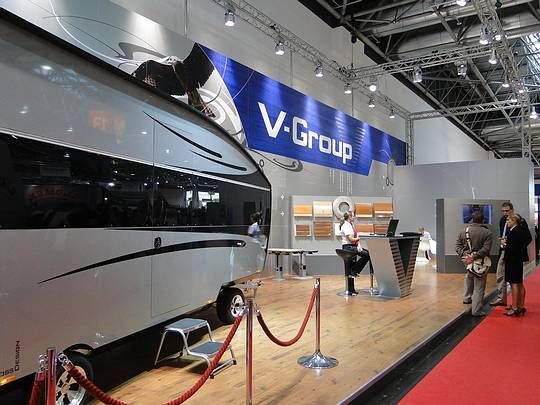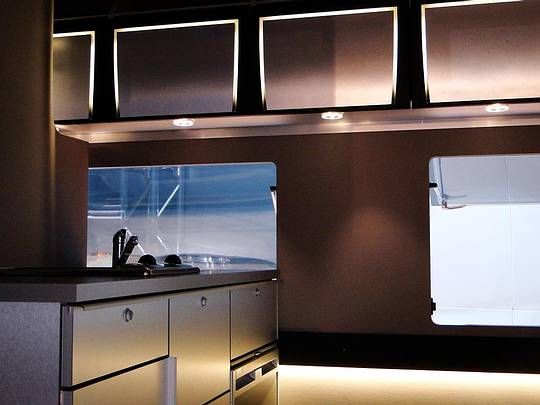Vöhringer GmbH with its 120 staff and ultramodern machine park in Trochtelfingen each day processes up to 40,000 m2 of sheeting. This is mainly used for manufacturing specialist furniture parts up to complete furniture sets – especially for caravans and mobile homes but also for exhibition stand construction, for doors and the furniture industry.
Chippings and dust accumulating during transport that represent an enormous volume will be extracted during this process and pressed into handy briquettes. A briquetting machine of WEIMA Maschinenbau GmbH to which a “TH 700 Trio plus” briquetting press was recently added has been proving its worth for years.

Picture 1: TH 700 with three press mechanisms
The new briquetting press has three press mechanisms, which are driven and controlled individually and thus work independent of one another. A fourth press mechanism can be connected as an option. The special advantages of this installation’s design lie in high material output and the extremely high process safety. When one of the press mechanisms is being serviced, the other two continue working so production is not affected.
The chippings and dust will be carried to a collection container almost at zero pressure via feed lines and a collection hopper to which a rotary feeder is connected. The material to be pressed will be mixed here by a continuously rotating agitator and then fed via a dosing unit (discharge screw) to the processing chamber.

Picture 2: Voehringer Group at the trade fair
The still loose material is then kept in the chamber and pre-sealed by a filler slide. This is followed by a second sealing stage in which a horizontal press cylinder brings the preformed briquette into its final, highly-compact shape and then discharges it. Even powdered material can be processed in this way without any additional binders. A volume reduction of 90 per cent is possible depending on the material composition and a normal humidity level between 6 and 12 per cent. Hydraulic cable control enables constant briquette firmness even if the material is changed.

Picture 3: Caravan from the inside
The briquettes produced are 70 mm in diameter and 70 to 80 mm long. They can be disposed of considerably cheaper than loose material. Furthermore, in contrast to loose chippings and dust, the danger of spontaneous ignition of the briquettes is considerably lower. The briquettes are also optionally and exceptionally suitable as heating fuel depending on their composition.
The container, which can be designed according to the customer’s specific design has basic dimensions of 3 m by 3 m with a height of 2 m. It is securely closed on all sides so that no material that has been blown in can escape. This will ensure that the production environment is not affected and that occupational safety regulations are complied with. Fine dust exiting directly on the press mechanisms is drawn off via suction devices and redirected via feed lines back to the container. The machine parts used in the actual pressing process are therefore always clean and only subject to little wear. The stationary and freely fitted installation weighs a total of ca. 3 tons.
The press mechanisms are driven via a hydraulic unit with a 7.5 kW electric motor. The three discharge screws are each driven via a 0.55 kW electric motor and the container’s agitator is also driven by a 2.2 kW electric motor. The installation is operated via easily accessible controls, optionally via conventional contactor control or via high-quality and proven SPS controls for fully automatic control. In order to compensate for temperature differences in the hydraulic oil, the machines are fitted with an oil heater for temperatures below 0° C and an oil cooler maintaining a maximum operating temperature of 75° C. The hydraulic systems are also fitted with safety switches for the maximum oil temperature thus preventing overheating and so preventing damage to the oil systems. The shredding of large-scale production waste takes place with a WEIMA “WL 15 Jumbo” single-shaft shredder with a 55 kW drive. The chippings produced will be incinerated and the heat generated used within the company.
Thomas Vöhringer, Managing Partner of Vöhringer GmbH: “The bottleneck of our production is the disposal of chippings and dust that has accumulated. The briquetting must be guaranteed of optimal functioning here with the minimum possibility of failure.

Picture 3: Voehringer headquarters, Trochtelfingen (Germany)
This enables us to considerably reduce the volumes accumulated and therefore represents a big savings potential, especially as regards the costs of logistics and disposal. The ability of WEIMA Maschinenbau GmbH to constructively adapt the design of the briquetting press to our special requirements and the smooth integration into our existing installation as well as competent advice and the reliable service were convincing arguments influencing our decision to purchase.”